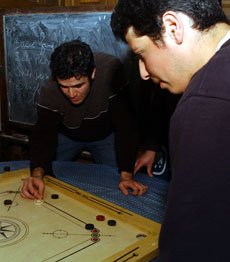Bangladeshi students perform for community

Online Poster
November 8, 2004
The first Bangladesh Night at the University brought a piece of Bangladesh to campus Saturday night at the University YMCA, 1001 S. Wright St.
Adults, students and children performed patriotic songs and love ballads from Bangladesh and recited poems. A slideshow showed video clips and pictures of sights and people from Bangladesh.
A short movie, created by the students in the Bangladesh Students Association, told the history of the country.
“It’s a small country,” said Ruella Rouf, freshman in LAS. “People get it confused with India … it’s not the same thing.”
Rouf said it was important to show that Bangladesh has its own culture. The Bangladesh Students Association created the night to portray many facets of the country, which is located east of India.
Get The Daily Illini in your inbox!
Last summer, a flood in Bangladesh spurred the association to raise money to send to flood victims.
“They (the donors) were very compassionate,” said Taher Saif, a mechanical engineering professor. “We’re giving our thanks back to the community.”
He said the purpose of the free event was also to talk about diversity and to have more dialogue about the eastern side of the world.
The announcers at the event said the relationship between Bangladesh and the University is important because Rabindranath Tagore, an alumnus of the University, won a Nobel Prize in literature and composed the Bangladesh national anthem.
Kristen Patterson and Xiao Yu, both freshmen in LAS, said they came to support a friend in the association and, Patterson said, “definitely to try the food.”
The association made several different foods from Bangladesh for the event, including beef wrapped in bread, a drink made of rice and milk and pitha – a sweet ball of fried dough.
Mehruba Firdaus sang during the cultural segment of the event. Firdaus, a University alumnus, attended the event with her husband and child.
After the movie and musical part of the event, the people who attended sampled the food, wore saris and had henna painted on their hands.
Graduate student Fariba Khan applied different designs on women’s hands with henna.
She said the henna was made of Mehdi tree leaves, tea and water.
“So it will stick to your hand,” Khan said.
Several girls who weren’t a part of the association stood on the stage during the event while Bangladeshi women wrapped their traditional saris over their clothes.
She said one of the saris, made of silk colored red and gold, could be worn to a sibling’s wedding.
Mojam Haque, who was visiting his daughter from Bangladesh, said a typical sari could be worth $400 to $500.
Embroidered silk pillowcases and saris were also on display.
Munima Haque, Mojam’s daughter, said women wear many different pieces of jewelry from their head to their feet.
She brought a bamboo desk calendar, which depicts facets of Bangladesh, to the event. Hague said the people of Bangladesh place their cultural heritage and parental ties at highest importance.






